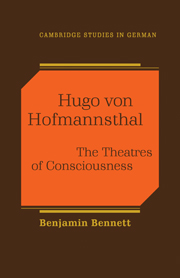Book contents
- Frontmatter
- Contents
- Preface
- Acknowledgments
- List of Abbreviations
- Part I Principles of lyric and drama
- Part II Language and society
- Part III Culture and collapse
- 13 Art by accident
- 14 The allomatic
- 15 The rôle of “Vorwitz” in Das Salzburger Groβe Welttheater
- 16 Salzburg as a theater
- 17 Goethe, Nietzsche, Thomas Taylor and Der Turm
- 18 A tower in ruins: the tragedy of a tragedy
- Conclusion
- Notes
- Index of works
- General index
17 - Goethe, Nietzsche, Thomas Taylor and Der Turm
Published online by Cambridge University Press: 04 August 2010
- Frontmatter
- Contents
- Preface
- Acknowledgments
- List of Abbreviations
- Part I Principles of lyric and drama
- Part II Language and society
- Part III Culture and collapse
- 13 Art by accident
- 14 The allomatic
- 15 The rôle of “Vorwitz” in Das Salzburger Groβe Welttheater
- 16 Salzburg as a theater
- 17 Goethe, Nietzsche, Thomas Taylor and Der Turm
- 18 A tower in ruins: the tragedy of a tragedy
- Conclusion
- Notes
- Index of works
- General index
Summary
The relation between the Groβes Welttheater and Faust brings us back to the importance of Goethe in Hofmannsthal's development. We have discussed the tension between the Goethean and the Kleistian; we have had occasion to mention Wilhelm Meister, Werther, Dichtung und Wahrheit, the correspondence with Schiller, and a parallel between Tasso and Der Schwierige; we might also have mentioned the confidence Hofmannsthal derived, in time of need, from Chamberlain's chapter on music and drama in Goethe. But in connection with Der Turm Goethe takes on perhaps a greater importance for Hofmannsthal than ever, and not only by way of particular works.
In 1925, the year the first version of Der Turm is published, we come upon a series of speech-notes in which Hofmannsthal presents himself as an older man, with many “disappointments” behind him (A 206), who is now attempting to make contact with a younger generation. The speech is entitled “Über Goethe oder über die Lebensalter” (A 205), and twice mentions a fragment of Alcmaeon, the full form of which (from Aristotle) is:
τοὺς, ἀνθϱώπους φησìν Aλϰμαíων διὰ τοῦτο ἀπόλλυσθαι ὅτι οὐ δύvανται τὴν ἀϱχὴν τῷ τέλει πϱοσάψαι.
(frag. 2 [Diels/Kranz])- Type
- Chapter
- Information
- Hugo von HofmannsthalThe Theaters of Consciousness, pp. 303 - 325Publisher: Cambridge University PressPrint publication year: 1988

